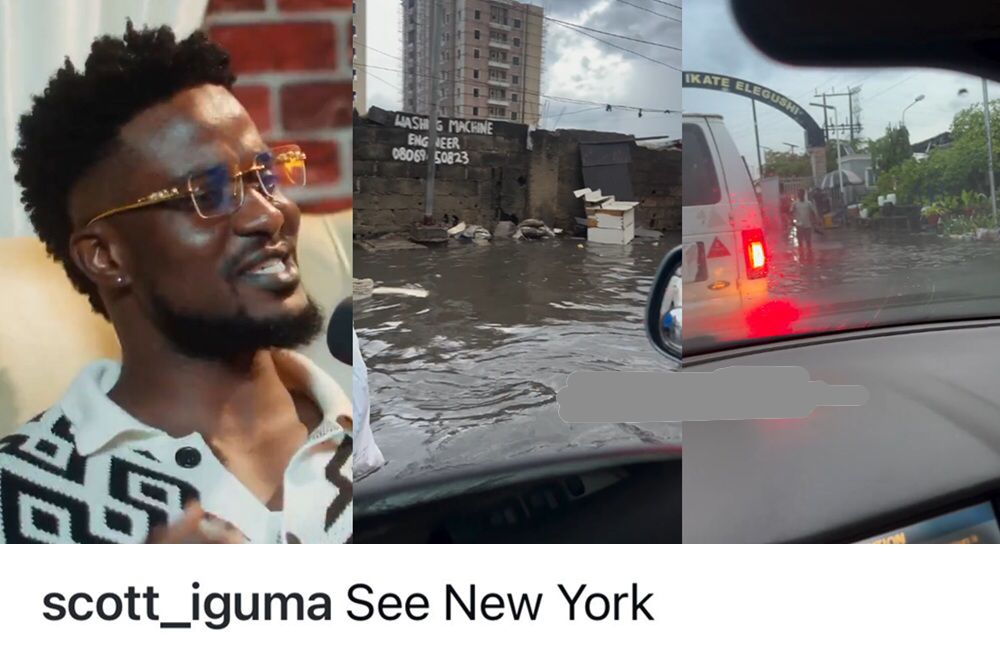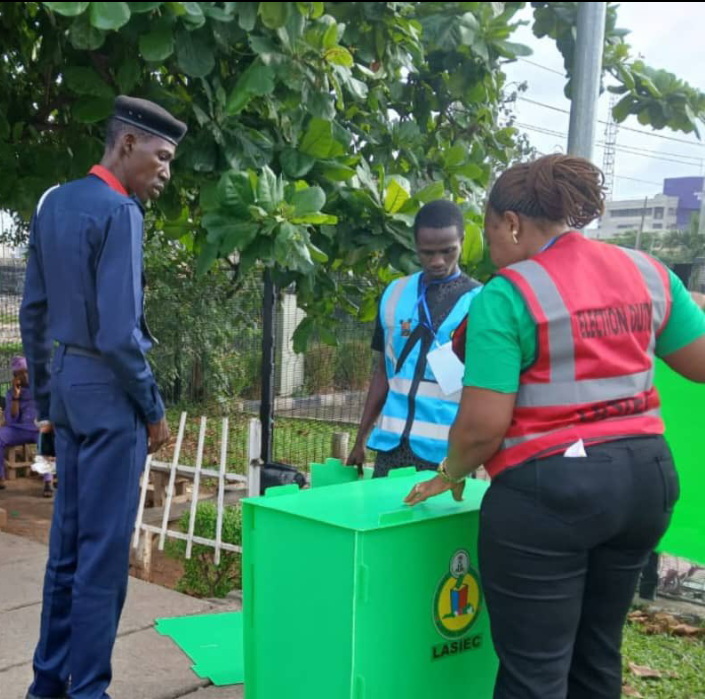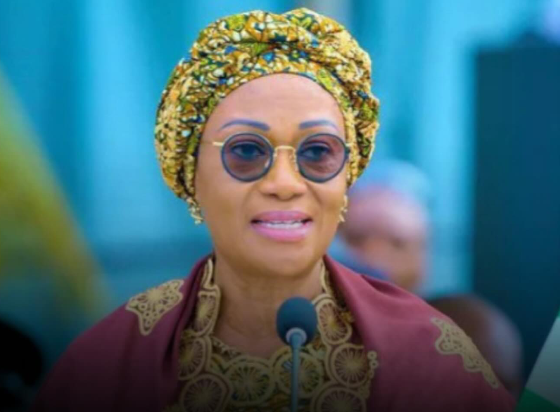
“See New York”: Scott Iguma Mocks Flooded Streets of Lekki in Viral Post
In what has sparked both laughter and outrage across social media, Nigerian media personality Scott Iguma took to Instagram with a sarcastic jab at the increasingly dire flooding situation in Lekki, Lagos, particularly around Ikate Elegushi. His post, which featured a video of severely waterlogged streets, was accompanied by a
In what has sparked both laughter and outrage across social media, Nigerian media personality Scott Iguma took to Instagram with a sarcastic jab at the increasingly dire flooding situation in Lekki, Lagos, particularly around Ikate Elegushi. His post, which featured a video of severely waterlogged streets, was accompanied by a biting caption: “See New York.” The irony wasn’t lost on his followers — or on the residents of the upscale neighborhood — as the satirical comment drew attention to what many are calling a recurring urban disaster in one of Lagos’ most prestigious areas.
The video, now widely circulated, showcases a chilling view of cars wading knee-deep in murky brown water, pedestrians stuck on sidewalks, and business premises partially submerged. The sarcasm in Scott Iguma’s caption couldn’t be clearer. By likening the flooded Lekki roads to the iconic visuals of New York City, he underscored the absurdity of a prime real estate area repeatedly turning into a swamp at the slightest downpour. It was a statement that resonated with many Lagosians who have grown increasingly frustrated by the seeming lack of long-term solutions to the region’s drainage problems.
Social media platforms, particularly X (formerly Twitter) and Instagram, lit up with reactions ranging from amused agreement to biting criticism. Some netizens applauded Scott’s post for calling out the government’s negligence in a way that was humorous yet effective. “He’s not wrong. That place costs millions to live in, and look at it — an artificial lagoon after every rain,” one user wrote. Another commented, “They collect all this money in Lekki for service charges, yet we can’t get basic drainage.”
However, not everyone was amused. A number of residents of Ikate Elegushi and neighboring communities found the post insensitive. “It’s easy to mock when you don’t live here,” one Instagram user replied. “Our cars are damaged, our businesses are suffering, and some of us can’t even get to work. This isn’t funny.” Others accused the media personality of using people’s real-life struggles as a punchline, while some questioned if his criticism would have more weight if it were paired with advocacy or community support.
Yet, the virality of the post has once again opened up a national conversation about Lagos’ fragile infrastructure and its inability to withstand seasonal rainfall, especially in elite zones like Lekki which ironically pride themselves on being the epitome of urban sophistication. The Ikate Elegushi area has particularly become a flood hotspot during every rainy season, raising questions about the sustainability of construction projects, blocked drainage systems, and the apparent absence of proactive urban planning.
Urban planners and environmentalists have repeatedly warned about the dangers of unchecked development in low-lying coastal areas like Lekki. Years of land reclamation, illegal buildings over drainage channels, and poor maintenance have led to a situation where the natural flow of water has been severely obstructed. “Lekki is sinking and we’re acting surprised every year,” one urban development expert tweeted in response to the trending video. “This is what happens when environmental impact assessments are treated as formalities and not guiding documents.”
The government has responded in the past with promises of upgrading the drainage systems, clearing water channels, and enforcing building codes. But residents argue that those promises have yielded little impact. Last year, similar footage emerged from Lekki during another torrential downpour, prompting Lagos State officials to deploy emergency response teams. Still, for many, the floods have become a dreaded ritual of the rainy season — predictable and unresolved.
Scott Iguma’s post may have been laced with sarcasm, but its underlying message was unmistakably critical. By choosing the phrase “See New York,” he mocked not just the physical state of the roads but also the image of modernity that Lekki attempts to project. New York, after all, is known for its towering skyscrapers, high-functioning urban systems, and elite neighborhoods. The comparison highlighted the massive gap between aspiration and reality, showing that flashy buildings and real estate prices mean nothing if residents still have to roll up their trousers and wade through filthy floodwaters.
Even more ironic is that many residents in Lekki moved there to escape the chaotic conditions of other parts of Lagos. The promise was exclusivity, serenity, and top-tier urban services. Yet, what they’ve gotten instead are flooded driveways, disrupted livelihoods, and viral mockery. Several business owners in the area reported closing for the day due to the impassable roads, and some claimed to have lost inventory due to water damage. With all these hardships, the humor in Scott’s post may have felt like salt in a wound — but to others, it was the wake-up call that Lagos authorities need to act before things get worse.
As of Monday morning, Lagos State’s Ministry of the Environment has yet to issue a formal response to the specific flooding incident in Ikate Elegushi, although they previously released a general public advisory urging residents to avoid flood-prone areas and report blocked drains. Whether these measures are proactive enough remains a subject of intense debate among environmental stakeholders, citizens, and online commentators alike.
The incident is the latest in a string of episodes that reveal the deep infrastructural fault lines in Nigeria’s most populous city. And while the rains may eventually stop, the images — and Scott Iguma’s caption — are likely to linger far longer in the public memory. It’s a stark reminder that beyond the glamour of luxury real estate and exotic-sounding estate names lies a reality of urban mismanagement that no filter or hashtag can hide.
In the end, Scott Iguma may have said what many were thinking but couldn’t express without backlash: that the Lagos dream sold to the middle and upper class is often just that — a dream. A beautiful illusion drowned in murky water every time the clouds gather. Until real structural changes are made, Lekki may just continue to trend for all the wrong reasons. And the next time someone says “See New York,” it might not be in admiration — but in irony.
Share this post
Related Posts

Tension in the Air as LASIEC Kicks Off Long-Awaited LGA Elections Across Lagos State
In what can only be described as a pivotal moment for grassroots democracy in Lagos...

A “Christmas Blessing” or Dangerous Precedent? Remi Tinubu’s Call for Expanded U.S. Military Strikes in Northern Nigeria Sparks Debate
Nigeria’s First Lady, Senator Remi Tinubu, has stirred intense national and international debate after publicly...

Chaos in Abuja: Soldiers Clash With FCT Minister Nyesom Wike, Block Him From Accessing Land
A dramatic scene unfolded in Abuja as soldiers reportedly clashed with the Minister of the...